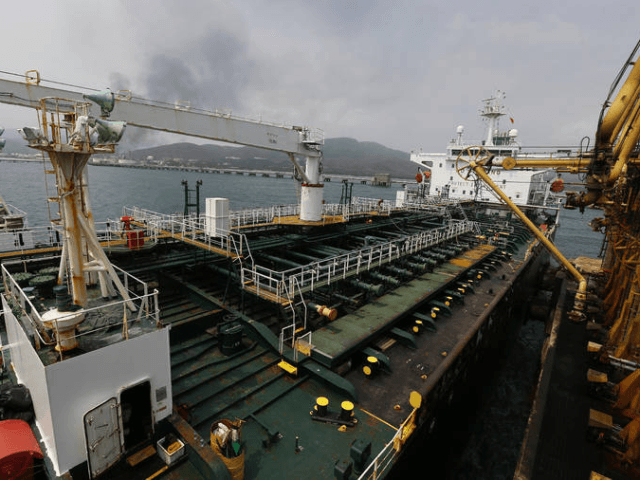The United States seized the cargo of four Iranian fuel tankers for transporting gas to Venezuela, a violation of sanctions, the Department of Justice announced on Friday.
Two senior U.S. officials involved in the seizures told the Associated Press that they did not employ military force during the operation and that the ships themselves were not confiscated. Instead, officials threatened ship owners, insurers, and captains with targeted sanctions to make them hand over their cargo.
According to another official, the four tankers were headed for Venezuela to deliver 1.1 million barrels of gasoline, a resource which the country is currently desperately short on. However, the seizure meant they never arrived at their destination and went missing, with two of the ships later showing up on the island of Cape Verde in the central Atlantic Ocean. They have since remained unaccounted for.
The Justice Department confirmed the incident late Friday morning, declaring it as the “largest-ever seizure of fuel shipments” from Iran:
The Justice Department today announced the successful disruption of a multimillion dollar fuel shipment by the Islamic Revolutionary Guard Corps (IRGC), a designated foreign terrorist organization, that was bound for Venezuela. These actions represent the government’s largest-ever seizure of fuel shipments from Iran. The government announced today that it has successfully executed the seizure order and confiscated the cargo from all four vessels, totaling approximately 1.116 million barrels of petroleum. With the assistance of foreign partners, this seized property is now in U.S. custody.
According to the statement, the Iranians then attempted to recover the shipments by boarding an “unrelated ship” in what was described as an “unsuccessful” operation:
After enforcement of the U.S. forfeiture order, Iran’s navy forcibly boarded an unrelated ship in an apparent attempt to recover the seized petroleum but was unsuccessful. U.S. Central Command published a video of the failed Iranian operation yesterday. Funds successfully forfeited with a connection to a state sponsor of terrorism may in whole or in part be directed to the United States Victims of State Sponsored Terrorism Fund.
Responding to the initial reports, the Iranian ambassador to Venezuela, Hojat Soltani, dismissed the reports as “yet another lie and psychological warfare” by the United States.
“The ships are not Iranian, and neither the owner nor its flag has anything to do with Iran,” Soltani wrote on Twitter in Spanish. “This is another lie and act of psychological warfare perpetrated by the US propaganda machine. The terrorist Trump cannot compensate for his humiliation and defeat by Iran using false propaganda.”
Otra mentira y guerra psicológica de la máquina de propaganda de #EEUU.
Los barcos no son iraníes, y ni el dueño ni su bandera no tiene nada que ver con #Irán.
El terrorista #trump no puede compensar su humillación y derrota contra Irán con falsas propagandas. pic.twitter.com/CVBijpJc0q— Hojat Soltani (@soltanihojjat) August 13, 2020
The seizure represents another blow to the Maduro regime, which despite Venezuela having the second-largest oil reserves in the world, currently finds itself unable to provide sufficient gasoline to its population. The widespread shortages have led to multiple fuel protests as people are forced to wait hours or even days to access gasoline, while no longer enjoying the government subsidies that allowed them to repeatedly fill up their vehicles for just a fraction of a cent.
The seizure will be seen in Washington as a victory for the Trump administration’s policy of maximum pressure against the Maduro regime, which has so far failed to remove him from power despite imposing an array of tough economic sanctions against senior socialist officials and the country’s vital oil industry.
With both countries under economic sanctions, the alliance between Iran and Venezuela has become closer over the past few years. As well as multiple oil shipments, the two rogue states have started initiatives such as the opening of an Iranian supermarket in Caracas and the signing of various “scientific and technological” agreements aimed at tightening cultural, diplomatic, and economic ties.
The close relationship, forged by socialist dictator Hugo Chávez in the early 21st century, is also increasingly considered as a threat to U.S. national security, as the Maduro regime is believed to be permitting Iran’s terror proxy Hezbollah to use Venezuelan territory as a base to expand their operations across Latin America.
Follow Ben Kew on Parler, Facebook, or Twitter. You can email him at bkew@breitbart.com.

COMMENTS
Please let us know if you're having issues with commenting.